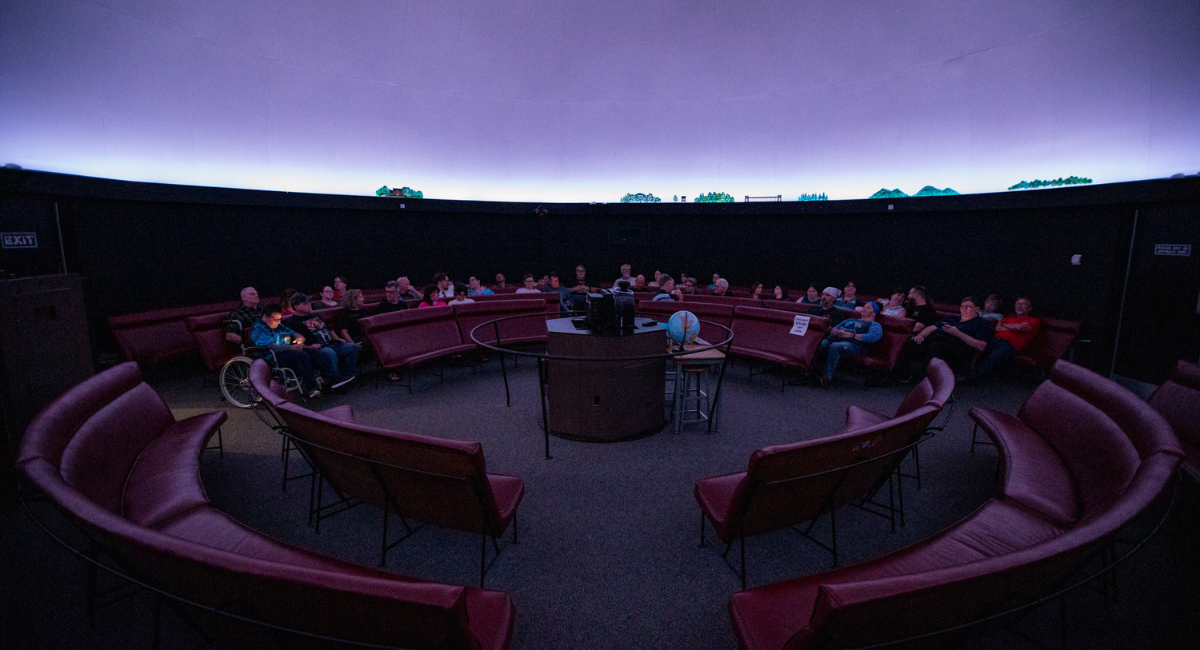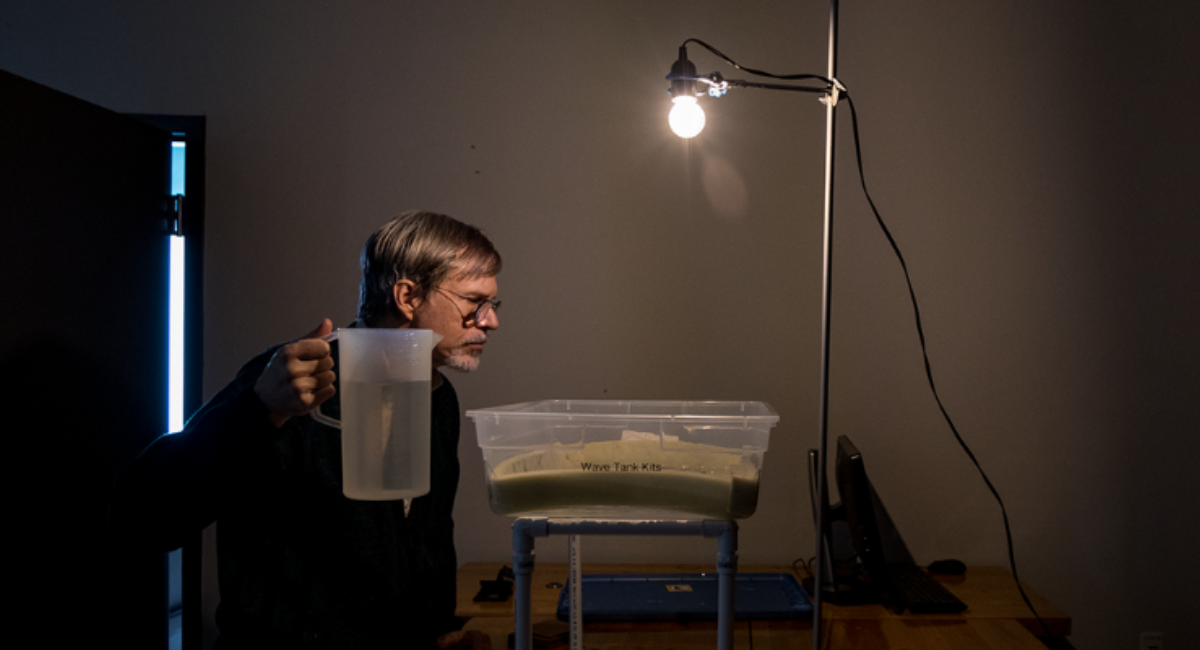Physics, Bachelor of Science (754)
- Undergraduate
- Bachelor of Science
- Science and Engineering
- Physics & Astronomy
Overview
The Physics Major (reference number 754) can, by proper choice of electives, prepare students for a wide variety of careers in STEM, graduate work in physics, astronomy, and related fields or professional schools such as medical school. Included in this major is a 3-2 Physics/Aerospace Engineering pathway. Under this pathway, students spend 3 years at WKU and two years at the University of Alabama, Tuscaloosa. At the end of 5 years, they receive a BS in Physics from WKU and a BS in Aerospace Engineering from UA. Details can be found on the department website at
https://www.wku.edu/physics/programs/aerospace_engineering_pathway/aerospace_engineering_pathway.php.
Concentrations
- Physics Education (PHEU)
Program Requirements (35 hours)
A baccalaureate degree requires a minimum of 120 unduplicated semester hours. More information can be found at www.wku.edu/registrar/degree_certification.php.
Students who began WKU in the Fall 2014 and thereafter should review the Colonnade requirements located at: https://www.wku.edu/colonnade/colonnaderequirements.php.
The major in physics requires a minimum of 35 semester hours and leads to a Bachelor of Science degree. A minor or second major is required. The foundation for the undergraduate major is provided by a core sequence of six lecture and five laboratory courses, requiring a total of 29 semester hours.
| Code | Title | Hours |
|---|---|---|
| Core Sequence | ||
| PHYS 180 & PHYS 181 | Introductory Modern Physics and Introductory Modern Physics Laboratory | 4 |
| PHYS 255 & PHYS 256 | University Physics I and University Physics I Lab | 5 |
| PHYS 265 & PHYS 266 | University Physics II and University Physics II Laboratory | 5 |
| PHYS 301 | Electrical Measurements Laboratory | 1 |
| PHYS 302 | Atomic Physics Laboratory | 1 |
| PHYS 316 | Computational Physics | 3 |
| or PHYS 318 | Data Acquisition Using Labview | |
| PHYS 321 | Introductory Modern Physics II | 3 |
| PHYS 350 | Classical Mechanics I | 3 |
| PHYS 398 | Junior Seminar | 0.5 |
| PHYS 440 | Electricity and Magnetism I | 3 |
| PHYS 498 | Senior Seminar | 0.5 |
| Select a minimum of 6 semester hours of upper division departmental courses 1 | 6 | |
| Total Hours | 35 | |
- 1
The selection is determined by the student’s career aspirations, subject to approval by the student’s departmental advisor. The upper division electives must be chosen from the courses listed for departmental majors and minors, excluding PHYS 389, PHYS 399, and PHYS 489.
No more than 3 hours of PHYS 475 may be counted toward the 35 hour minimum requirement for the major.
| Code | Title | Hours |
|---|---|---|
| Support Requirements | ||
| MATH 136 | Calculus I | 4 |
| MATH 137 | Calculus II | 4 |
| MATH 237 | Multivariable Calculus | 4 |
| MATH 307 | Introduction to Linear Algebra (or MATH 370 for applied physics track) | 3 |
| MATH 331 | Differential Equations | 3 |
| CHEM 120 & CHEM 121 | College Chemistry I and College Chemistry I Laboratory | 5 |
(Support requirements differ for teacher certification; see below.) The department has prepared several career-oriented tracks, which detail relevant departmental electives and additional or departmentally-approved substitute support courses. Advising tracks currently defined within the Bachelor of Science in physics program include the following:
- The general physics track is designed for those students who wish to pursue careers as physicists or are preparing for graduate study in physics.
- The applied physics track combines extensive technical knowledge, related problem-solving skills, and computer techniques and internship opportunities to prepare students for positions in industrial and governmental laboratories.
- The physics and astronomy track prepares students for careers in astronomy/space science and for graduate study in these areas.
- The teacher certification track prepares students for careers teaching physics at the secondary school level. The student must also complete professional education requirements as specified by the School of Teacher Education. Students in this option must have a second major in science and math education (SMED).
- Other - There are some specified programs such as a suggested pre-medicine curriculum for students wishing to major in physics. Course recommendations for these tracks are available from the departmental office. In all cases, the student must work closely with the departmental advisor from the beginning to plan a program of study that meets departmental and University requirements and that maximizes preparation to meet career goals.
Transfer of Credit
Transfer courses are welcomed and approved through the Physics faculty and College Dean.
Finish in Four Plans
Physics, No Concentration
| First Year | |||
|---|---|---|---|
| Fall | Hours | Spring | Hours |
| PHYS 180 | 3 | PHYS 255 | 4 |
| PHYS 181 | 1 | PHYS 256 | 1 |
| MATH 136 | 4 | MATH 137 | 4 |
| ENG 100 | 3 | CHEM 120 | 3 |
| COMM 145 | 3 | CHEM 121 | 2 |
| PHYS 170 | 1 | HIST 101 or HIST 102 | 3 |
| PHYS 171 | 1 | ||
| 15 | 18 | ||
| Second Year | |||
| Fall | Hours | Spring | Hours |
| PHYS 265 | 4 | PHYS 321 | 3 |
| PHYS 266 | 1 | MATH 331 | 3 |
| MATH 237 | 4 | PHYS 301 | 1 |
| MATH 307 or MATH 370 | 3 | ENG 300 | 3 |
| ENG 200 | 3 | Colonnade | 3 |
| Colonnade | 3 | ||
| 15 | 16 | ||
| Third Year | |||
| Fall | Hours | Spring | Hours |
| PHYS 350 | 3 | PHYS 480 (or PHYS 441/404) | 3 |
| PHYS 470 & PHYS 407 (or PHYS 460/406 or PHYS 425) | 4 | PHYS 316 | 3 |
| PHYS 302 | 1 | PHYS 398 | 0.5 |
| MATH 435 | 3 | PHYS 450 or PHYS 445 | 3 |
| PHYS 330 | 3 | MATH 382 | 3 |
| Colonnade | 3 | Colonnade | 3 |
| 17 | 15.5 | ||
| Fourth Year | |||
| Fall | Hours | Spring | Hours |
| PHYS 470 & PHYS 407 (or PHYS 460/406 or PHYS 425) | 4 | PHYS 445 or PHYS 450 | 3 |
| PHYS 440 | 3 | MATH 450 | 3 |
| PHYS 498 | 0.5 | PHYS 480 (or PHYS 441/404) | 3 |
| PHYS 318 | 3 | Colonnade | 3 |
| Colonnade | 3 | ||
| Colonnade | 3 | ||
| 16.5 | 12 | ||
| Total Hours 125 | |||
Physics, Physics Education
| First Year | |||
|---|---|---|---|
| Fall | Hours | Spring | Hours |
| PHYS 170 | 1 | PHYS 171 | 1 |
| PHYS 180 | 3 | PHYS 255 | 4 |
| PHYS 181 | 1 | PHYS 256 | 1 |
| MATH 136 | 4 | MATH 137 | 4 |
| ENG 100 | 3 | PHIL 215 or EE 180 | 3 |
| Colonnade - Arts & Humanities | 3 | HIST 101 or HIST 102 | 3 |
| SMED 101 | 3 | SMED 102 | 3 |
| COMM 145 | 3 | ||
| 21 | 19 | ||
| Second Year | |||
| Fall | Hours | Spring | Hours |
| PHYS 265 | 4 | PHYS 321 | 3 |
| PHYS 266 | 1 | PHYS 301 | 1 |
| MATH 237 | 4 | MATH 307 | 3 |
| ENG 200 | 3 | CHEM 120 | 3 |
| SMED 310 | 3 | CHEM 121 | 2 |
| SMED 320 | 3 | ||
| 15 | 15 | ||
| Third Year | |||
| Fall | Hours | Spring | Hours |
| PHYS 302 | 1 | PHYS 440 | 3 |
| PHYS 350 | 3 | PHYS 398 | 0.5 |
| PHYS 316 or PHYS 318 | 3 | Colonnade - Social & Cultural | 3 |
| ENG 300 | 3 | Colonnade - Local to Global | 3 |
| SMED 340 | 3 | SMED 360 | 3 |
| MATH 331 | 3 | SPED 330 | 3 |
| 16 | 15.5 | ||
| Fourth Year | |||
| Fall | Hours | Spring | Hours |
| PHYS upper-division Elective | 3 | SMED 489 | 3 |
| PHYS upper-division Elective | 3 | SEC 490 | 10 |
| PHYS 498 | 0.5 | ||
| Colonnade - Systems | 3 | ||
| SMED 470 | 3 | ||
| LTCY 421 | 3 | ||
| 15.5 | 13 | ||
| Total Hours 130 | |||











